牛津深圳版九年级下册Module1 Explorations and exchanges Unit 2 第2课时 Reading习题课件(共17张PPT)
文档属性
| 名称 | 牛津深圳版九年级下册Module1 Explorations and exchanges Unit 2 第2课时 Reading习题课件(共17张PPT) | 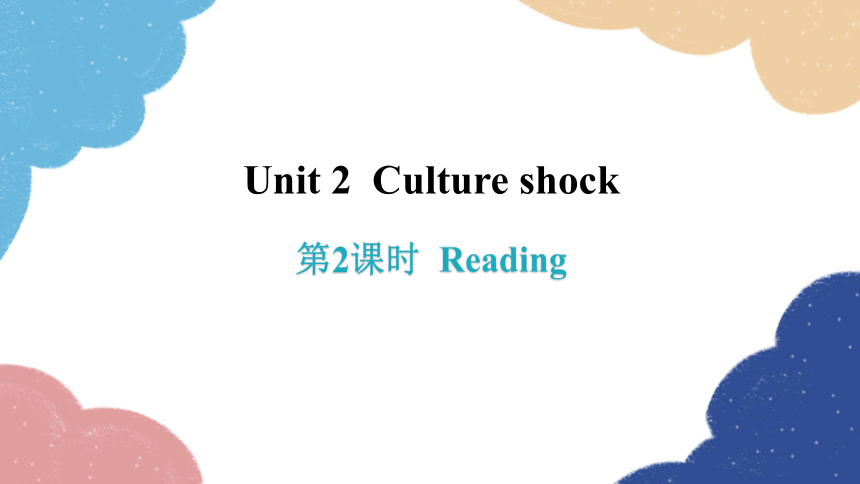 | |
| 格式 | pptx | ||
| 文件大小 | 391.2KB | ||
| 资源类型 | 教案 | ||
| 版本资源 | 牛津深圳版 | ||
| 科目 | 英语 | ||
| 更新时间 | 2022-10-03 13:59:10 | ||
图片预览

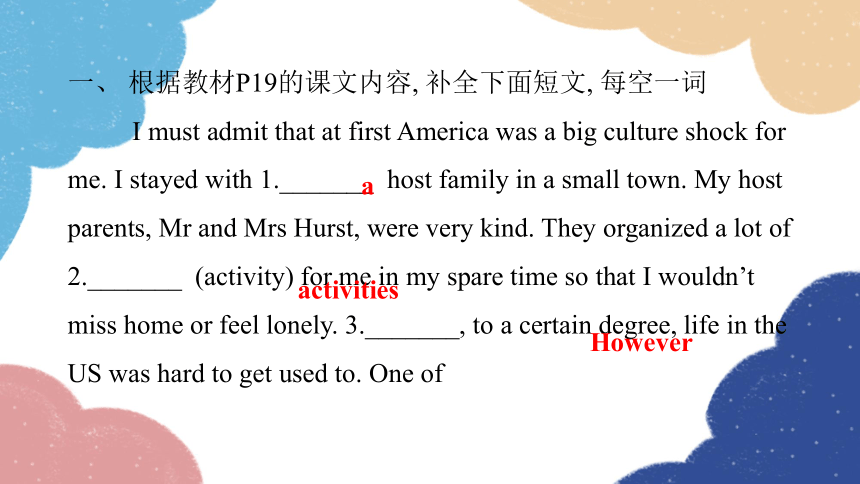
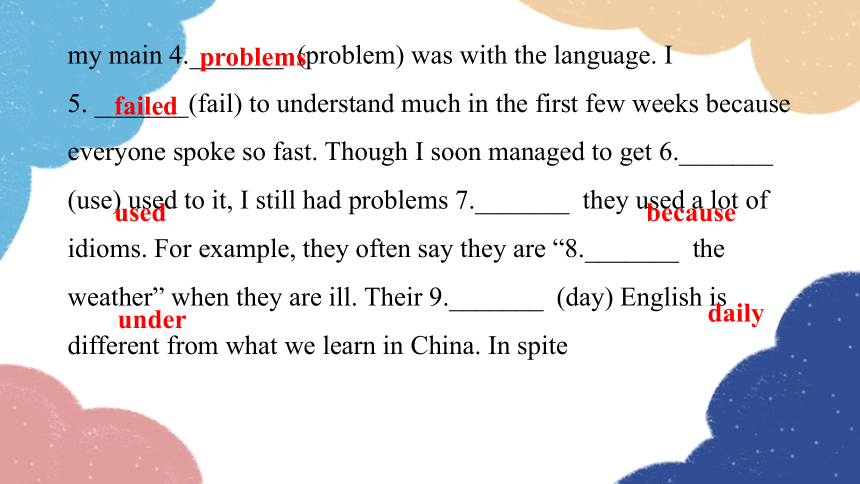
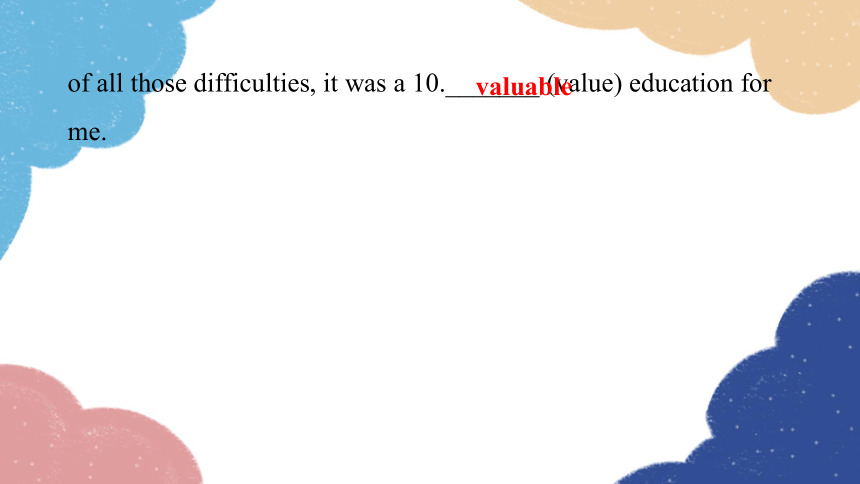
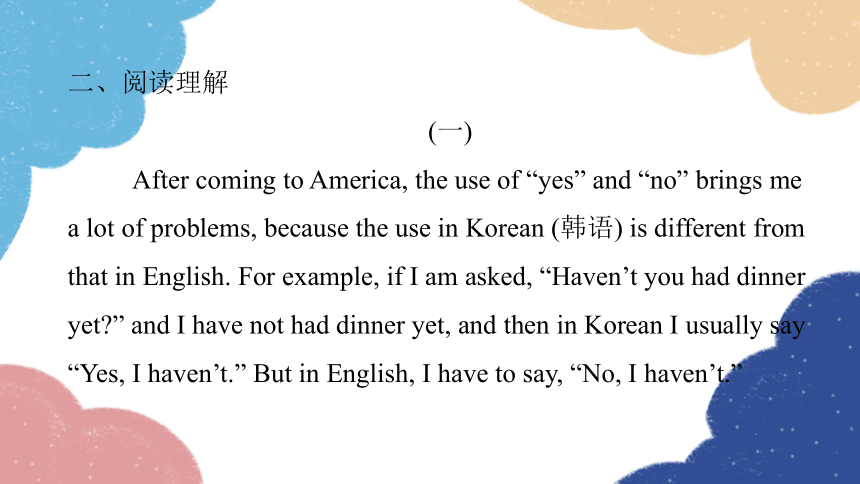
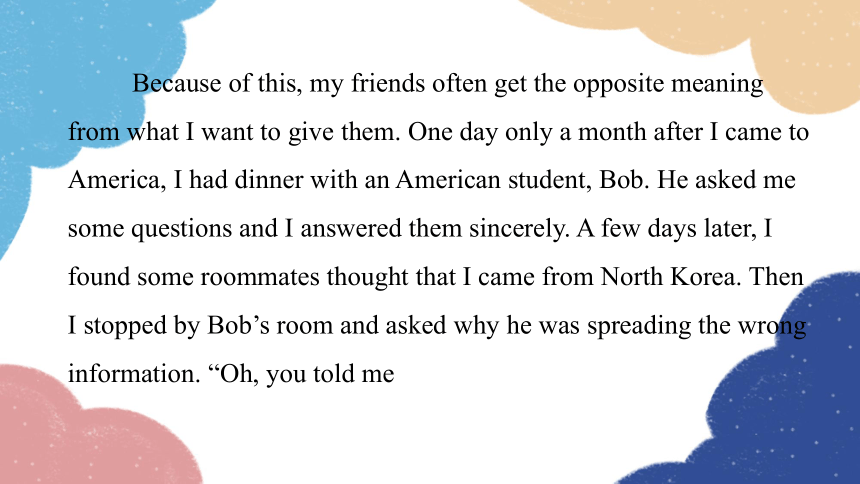
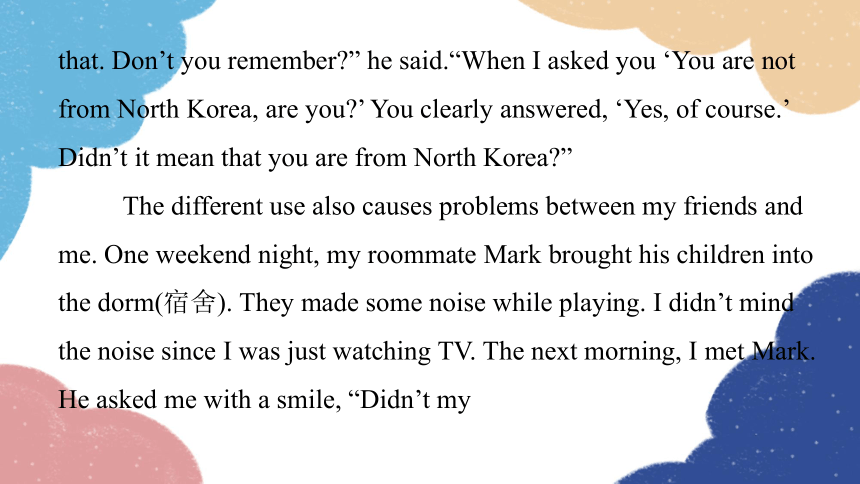
文档简介
(共17张PPT)
Unit 2 Culture shock
第2课时 Reading
一、 根据教材P19的课文内容, 补全下面短文, 每空一词
I must admit that at first America was a big culture shock for me. I stayed with 1._______ host family in a small town. My host parents, Mr and Mrs Hurst, were very kind. They organized a lot of 2._______ (activity) for me in my spare time so that I wouldn’t miss home or feel lonely. 3._______, to a certain degree, life in the US was hard to get used to. One of
a
activities
However
my main 4._______ (problem) was with the language. I
5. _______(fail) to understand much in the first few weeks because everyone spoke so fast. Though I soon managed to get 6._______ (use) used to it, I still had problems 7._______ they used a lot of idioms. For example, they often say they are “8._______ the weather” when they are ill. Their 9._______ (day) English is different from what we learn in China. In spite
problems
failed
used
because
under
daily
of all those difficulties, it was a 10._______ (value) education for me.
valuable
二、阅读理解
(一)
After coming to America, the use of “yes” and “no” brings me a lot of problems, because the use in Korean (韩语) is different from that in English. For example, if I am asked, “Haven’t you had dinner yet ” and I have not had dinner yet, and then in Korean I usually say “Yes, I haven’t.” But in English, I have to say, “No, I haven’t.”
Because of this, my friends often get the opposite meaning from what I want to give them. One day only a month after I came to America, I had dinner with an American student, Bob. He asked me some questions and I answered them sincerely. A few days later, I found some roommates thought that I came from North Korea. Then I stopped by Bob’s room and asked why he was spreading the wrong information. “Oh, you told me
that. Don’t you remember ” he said.“When I asked you ‘You are not from North Korea, are you ’ You clearly answered, ‘Yes, of course.’ Didn’t it mean that you are from North Korea ”
The different use also causes problems between my friends and me. One weekend night, my roommate Mark brought his children into the dorm(宿舍). They made some noise while playing. I didn’t mind the noise since I was just watching TV. The next morning, I met Mark. He asked me with a smile, “Didn’t my
children make noise last night Didn’t it make you uncomfortable ” Because I did not mind the noise at all, I clearly said “Yes!” The smile suddenly disappeared from Mark’s face, and he said, “I am sorry about that. They are going right now. See you later.” I could not understand what he was sorry about, and I just said, “OK. Bye!” After a moment of thinking, I realized how stupid I was. That evening, I explained to Mark and said sorry to him. I knew he thought that I had been very rude.
Now to deal with this problem, I have set simple rules: First, take a five-second break if I am not sure of “yes” or “no”. Second, use “pardon me”, so the person may explain to me in a direct way.
( )1. Where does the writer come from according to the passage
A. North Korea. B. America. C. South Korea. D. China.
C
( )2. What may Mark think of the writer when the writer answered “Yes!” in Paragraph 3
A. Rude. B. Kind. C. Helpful. D. Polite.
( )3. What does the underlined word “it” in Paragraph 3 refer to
A. “Yes”. B. The noise.
C. Watching TV. D. The smile.
A
B
( )4. What will the writer say if he is not sure of “yes” or “no” next time
A. Pardon me. B. Yes. C. No. D. I don’t know.
( )5. What is the passage mainly about
A. To remind us to work hard in English.
B. To remind us to learn to respect others.
C. To remind us never to use “yes” or “no”.
D. To remind us to know cultural differences.
A
D
(二)
信息匹配。阅读下面不同国家的日常行为规范或风俗习惯,为五个人选出合适他们的规范或习俗,并将其标号填入题前括号内。
A. If an American is satisfied with you, he will put his thumb(拇指) and forefinger(食指) into a circle. That means “OK”.
B. In England, leaving food on the plate is impolite. A visitor always finishes the food to show he has enjoyed it.
C. In India, when you are shaking your head, you are saying “yes” while a nod means “no”.
D. In England, people should line up for a bus and the person who arrives at the bus stop early can get the bus first.
E. At a meal in the Arabian Peninsula (阿拉伯半岛), you will find your glass refilled as soon as you drink up. If you have drunk enough, put your hand over the glass.
F. In France, when you visit a friend, flowers are the best gift for the hostess.
( )1. Three foreigners came to a bus stop where many people waited in a queue(队列). They wanted to get on the bus directly, but others pushed them out of the way. They felt very surprised.
D
( )2. A thirsty Chinese man came into a restaurant and the waiter came to him with a drink. The Chinese man smiled and nodded. But to his surprise, the waiter took the drink away.
( )3. My aunt gave us a very big meal, and we all ate them up. She was very happy to see that.
( )4. Once I was invited to a dinner. I drank too much because the hostess refilled my glass again and again, even though I had drunk a lot.
C
B
E
( )5. Mr Smith went to a friend’s house. He brought 15 flowers and gave them to his friend’s wife. She was very happy and put them in a vase.
F
THANKS!
Unit 2 Culture shock
第2课时 Reading
一、 根据教材P19的课文内容, 补全下面短文, 每空一词
I must admit that at first America was a big culture shock for me. I stayed with 1._______ host family in a small town. My host parents, Mr and Mrs Hurst, were very kind. They organized a lot of 2._______ (activity) for me in my spare time so that I wouldn’t miss home or feel lonely. 3._______, to a certain degree, life in the US was hard to get used to. One of
a
activities
However
my main 4._______ (problem) was with the language. I
5. _______(fail) to understand much in the first few weeks because everyone spoke so fast. Though I soon managed to get 6._______ (use) used to it, I still had problems 7._______ they used a lot of idioms. For example, they often say they are “8._______ the weather” when they are ill. Their 9._______ (day) English is different from what we learn in China. In spite
problems
failed
used
because
under
daily
of all those difficulties, it was a 10._______ (value) education for me.
valuable
二、阅读理解
(一)
After coming to America, the use of “yes” and “no” brings me a lot of problems, because the use in Korean (韩语) is different from that in English. For example, if I am asked, “Haven’t you had dinner yet ” and I have not had dinner yet, and then in Korean I usually say “Yes, I haven’t.” But in English, I have to say, “No, I haven’t.”
Because of this, my friends often get the opposite meaning from what I want to give them. One day only a month after I came to America, I had dinner with an American student, Bob. He asked me some questions and I answered them sincerely. A few days later, I found some roommates thought that I came from North Korea. Then I stopped by Bob’s room and asked why he was spreading the wrong information. “Oh, you told me
that. Don’t you remember ” he said.“When I asked you ‘You are not from North Korea, are you ’ You clearly answered, ‘Yes, of course.’ Didn’t it mean that you are from North Korea ”
The different use also causes problems between my friends and me. One weekend night, my roommate Mark brought his children into the dorm(宿舍). They made some noise while playing. I didn’t mind the noise since I was just watching TV. The next morning, I met Mark. He asked me with a smile, “Didn’t my
children make noise last night Didn’t it make you uncomfortable ” Because I did not mind the noise at all, I clearly said “Yes!” The smile suddenly disappeared from Mark’s face, and he said, “I am sorry about that. They are going right now. See you later.” I could not understand what he was sorry about, and I just said, “OK. Bye!” After a moment of thinking, I realized how stupid I was. That evening, I explained to Mark and said sorry to him. I knew he thought that I had been very rude.
Now to deal with this problem, I have set simple rules: First, take a five-second break if I am not sure of “yes” or “no”. Second, use “pardon me”, so the person may explain to me in a direct way.
( )1. Where does the writer come from according to the passage
A. North Korea. B. America. C. South Korea. D. China.
C
( )2. What may Mark think of the writer when the writer answered “Yes!” in Paragraph 3
A. Rude. B. Kind. C. Helpful. D. Polite.
( )3. What does the underlined word “it” in Paragraph 3 refer to
A. “Yes”. B. The noise.
C. Watching TV. D. The smile.
A
B
( )4. What will the writer say if he is not sure of “yes” or “no” next time
A. Pardon me. B. Yes. C. No. D. I don’t know.
( )5. What is the passage mainly about
A. To remind us to work hard in English.
B. To remind us to learn to respect others.
C. To remind us never to use “yes” or “no”.
D. To remind us to know cultural differences.
A
D
(二)
信息匹配。阅读下面不同国家的日常行为规范或风俗习惯,为五个人选出合适他们的规范或习俗,并将其标号填入题前括号内。
A. If an American is satisfied with you, he will put his thumb(拇指) and forefinger(食指) into a circle. That means “OK”.
B. In England, leaving food on the plate is impolite. A visitor always finishes the food to show he has enjoyed it.
C. In India, when you are shaking your head, you are saying “yes” while a nod means “no”.
D. In England, people should line up for a bus and the person who arrives at the bus stop early can get the bus first.
E. At a meal in the Arabian Peninsula (阿拉伯半岛), you will find your glass refilled as soon as you drink up. If you have drunk enough, put your hand over the glass.
F. In France, when you visit a friend, flowers are the best gift for the hostess.
( )1. Three foreigners came to a bus stop where many people waited in a queue(队列). They wanted to get on the bus directly, but others pushed them out of the way. They felt very surprised.
D
( )2. A thirsty Chinese man came into a restaurant and the waiter came to him with a drink. The Chinese man smiled and nodded. But to his surprise, the waiter took the drink away.
( )3. My aunt gave us a very big meal, and we all ate them up. She was very happy to see that.
( )4. Once I was invited to a dinner. I drank too much because the hostess refilled my glass again and again, even though I had drunk a lot.
C
B
E
( )5. Mr Smith went to a friend’s house. He brought 15 flowers and gave them to his friend’s wife. She was very happy and put them in a vase.
F
THANKS!
